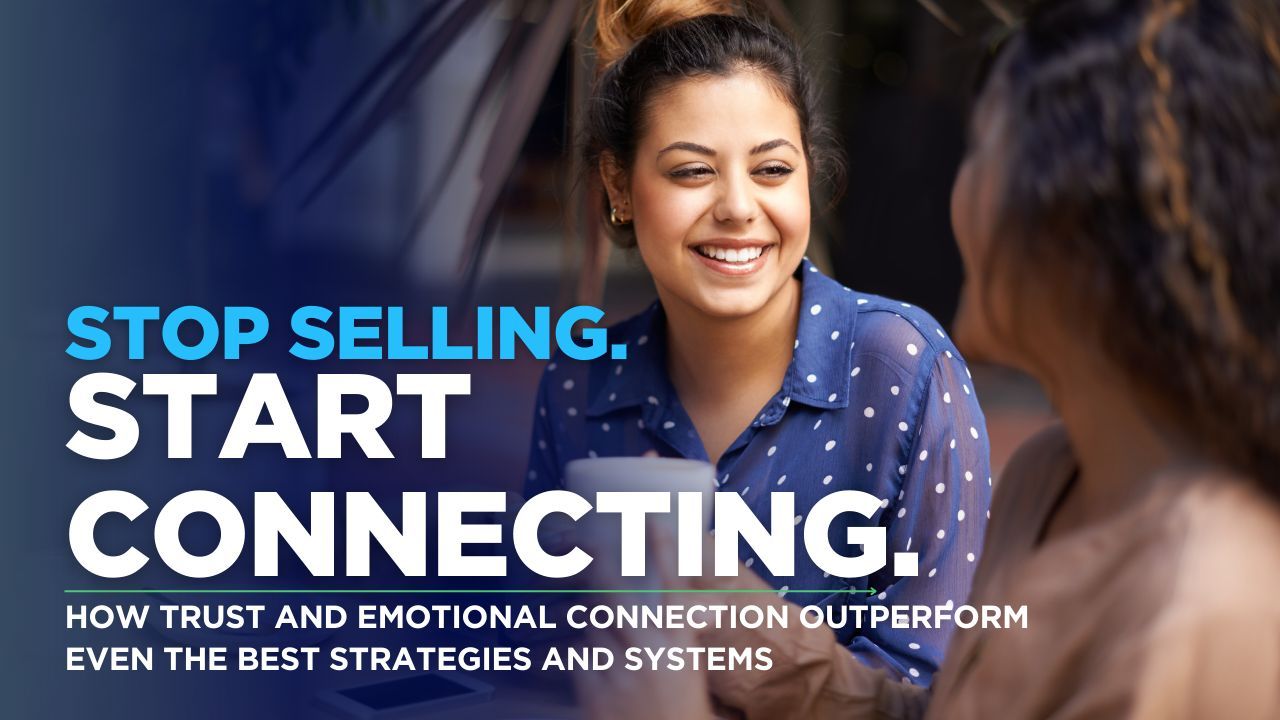Stop Selling. Start Connecting.
Sep 15, 2025
How trust and emotional connection outperform even the best strategies and systems.
In today’s high-ticket marketplace, clients don’t need more options; they’re drowning in them.
What they crave isn’t another polished pitch.
It’s trust. It’s a connection.
It’s the felt experience of doing business with someone who understands them, sees them, and makes them feel safe choosing.
Here’s the paradox: the companies that win aren’t always the ones with the best product, process, or pricing. They’re the ones who master the human side of business. The leaders who know that emotional connection, how people feel in your presence, outperform even the most sophisticated strategy or system.
The Paradox of Technology
Automation was supposed to save time and streamline communication. Instead, it often stripped away the very thing people value most: human connection.
Chatbots respond instantly, CRMs track every click, and AI drafts endless outreach, but none of these make a person feel genuinely seen.
Consider the once-dominant local business that replaced personal phone calls with generic emails. What looked like efficiency quickly became detachment. Long-time customers who once felt like family began drifting away. The business didn’t lose its clients because of price or service gaps. It lost them because it removed the personal touch.
Technology can support connection, but it cannot replace it. Because no matter how advanced our tools become, people are still people. They want to feel safe, heard, valued, and inspired.
The Science of Emotional Connection
Harvard Business Review research found that emotionally connected customers are more than twice as valuable as highly satisfied ones, because they buy more, stay longer, and advocate more passionately.
Nielsen reports that 92% of people trust recommendations from friends and family more than any form of advertising. Trust is not a marketing slogan; it’s the most reliable growth engine available.
This doesn’t stop at clients. The emotional climate of a business shapes everyone in its ecosystem:
- Team members stay longer and contribute more when they feel trusted and valued.
- Vendors and partners lean in when they sense respect and alignment.
- Investors and lenders bet on leadership trust as much as on financial models.
- Communities and neighbors either amplify or erode your reputation by how you show up.
Connection isn’t a “soft skill.” It’s a valuation driver.
From Transaction to Transformation
The best companies at the high end of the market don’t just deliver products or services. They create experiences that people remember.
- The Ritz-Carlton empowers employees to spend up to $2,000 to resolve a guest issue on the spot. The point isn’t the dollar amount; it’s showing that care comes first.
- Apple’s Genius Bar made technology feel less intimidating by creating human moments of empathy and discovery.
- Southwest Airlines, competing in a commodity industry, became a loyalty powerhouse by building humor and kindness into its culture.
These aren’t tactics. They’re cultural choices. Choices that say: “You matter here.”
The PeopleFlow™ Lens
Through the PeopleFlow™ framework:
- Value + Impact = Profit. Clients don’t just buy efficiency; they buy the impact they can feel.
- Ecosystems, not transactions. Every stakeholder, client, team, vendor, and lender is part of one interconnected flow. Trust in one area strengthens the whole system.
- Legacy leadership. The companies with the highest long-term valuations build reputational capital, not just financial capital.
When businesses forget this, they don’t have a cash flow problem; they have a PeopleFlow™ problem.
Three Practices That Build Trust
How do you personalize interactions at scale without faking it?
- Presence over performance. People don’t need a perfect pitch. They need you to listen. As René Rodriguez notes in Amplify Your Influence, people are moved when they feel safe, heard, valued, and inspired.
- Memorable small touches. Research in consumer psychology shows that small, unexpected gestures like remembering a personal detail or celebrating a milestone have a disproportionate emotional impact.
- Consistency across relationships. Loyalty compounds when clients, employees, vendors, and community members all experience alignment. Trust doesn’t stay in silos; it multiplies across your ecosystem.
From Good to Great to Legacy
Jim Collins showed that the leap from good to great comes from clarity about what you can uniquely excel at. But the leap beyond great, the leap into legacy, comes from emotional connection.
At the end of the day, people won’t remember the price you quoted. They’ll remember how you made them feel.
When they feel aligned, respected, and inspired, your business stops being just another option. It becomes the obvious one.
Closing Thought
The future of high-ticket sales doesn’t belong to those who push harder. It belongs to those who connect deeper. Emotional connection is no longer a nice-to-have. It’s the ultimate competitive advantage.
Stop selling. Start connecting. Watch what happens when trust becomes your greatest system.

